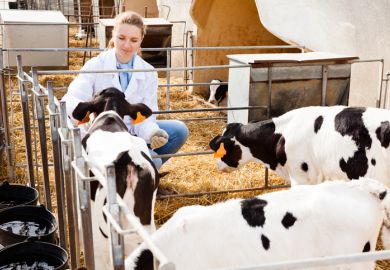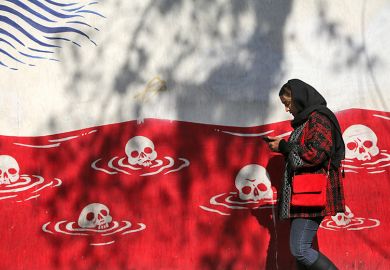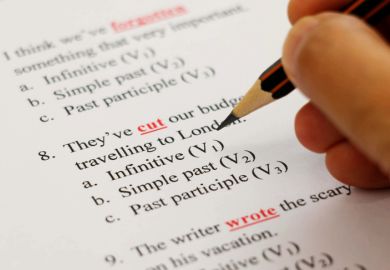Source: Alamy
No safe haven: some opponents of the regime fear that Islamists in the rebels’ ranks could make a post-Assad Syria ‘even worse’
Noura* is running out of money. A common experience for PhD students, you might think, but her situation is different: she is from Syria, and her sources of funding - not to mention her peace of mind - have been ruined by the country’s civil war.
“It won’t take me more than three or four months to run out of money,” said Noura, who is in the second year of her doctorate at a Welsh university. “I do not know what to do.”
Her family planned to sell a house in a Damascus suburb to finance her studies, but it has been damaged in the conflict and selling even an intact property in the capital at the moment would be all but impossible, she said.
Noura’s father was a university professor whose salary could also have provided a lifeline, but since a rocket hit a nearby house, he and Noura’s mother have fled to Brazil, using up the last of the family’s savings.
With UK university fees of more than £1,000 a month and a 16-year-old daughter to support, Noura said she is “living, but it’s not easy”.
“I am very keen to finish my PhD,” she explained, but her worries over fees and the fate of her parents have taken a psychological and physical toll. Colleagues “come to my room and find me crying”, she said, and the stress has triggered three months of persistent flu and bronchitis, although Noura has felt physically better since her parents managed to escape.
Her supervisor has suggested she suspend her PhD, and this is Noura’s preferred option, but she feels unable to do this because “every day counts” financially while her dwindling funds allow her to stay.
The stress of the civil war has affected her daughter, who has had to have counselling at school. A friend of her daughter’s, who is still in Syria, was recently injured after a shell hit her school.
Noura’s daughter does not know when she will be able to return to Syria. She is “protecting herself by not thinking about anything other than her studies. I find her crying because she misses home…she is watching the country being destroyed”, Noura said, although gradually she is beginning to think of the UK as her home and is making friends at school.
Noura herself has contemplated applying for asylum in the UK. “But most refugees get refused and I will be threatened with deportation.
“I miss my country; I miss being able to speak Arabic normally. We are still foreigners,” she said, but added that she has been made to feel “welcome” in Wales.
She is trained as a medical doctor, but has not practised for eight years and estimates that it would take around two years - and a lot of money - to retrain and qualify in the UK, so this is not a solution that would enable her to stay in the UK.
Last week Vince Cable, the business secretary, and David Willetts, the universities and science minister, wrote to Universities UK to urge institutions to do all they could to assist Syrian students, including waiving or deferring fees.
For example, the University of Edinburgh and Newcastle University had deferred fees and were providing funds to those in need, the ministers explained.
At the end of February, the UK Border Agency said it was continuing with an arrangement that allows Syrians to apply for a renewal of their current visas.
Noura has been speaking to her university about the possibility of deferring fees and is in the process of applying for help from the Council for Assisting Refugee Academics, but she has no promises of assistance as yet.
Whatever the outcome of the civil war, Noura, a Christian, fears the consequences of victory for either side.
“There’s a huge appearance of Islamists among the rebels,” she warned, and recounts stories of churches being attacked and Christian women killed near her parents’ Damascus home. “I don’t trust them; it would be even worse,” she added.
But after attacking Bashar al-Assad’s regime online, she believes she would not be safe in Syria if the government eventually prevailed.
“Many people know that I’m not with the regime,” she said. “I couldn’t live under [Assad’s] leadership again; my dignity would be taken [away].”
* The student’s name has been changed to protect her identity.
Register to continue
Why register?
- Registration is free and only takes a moment
- Once registered, you can read 3 articles a month
- Sign up for our newsletter
Subscribe
Or subscribe for unlimited access to:
- Unlimited access to news, views, insights & reviews
- Digital editions
- Digital access to THE’s university and college rankings analysis
Already registered or a current subscriber?




